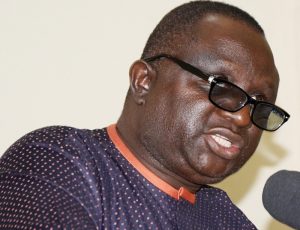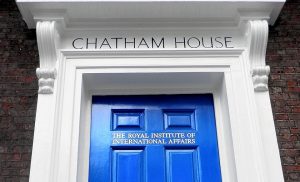Insecurity in the Sahel will be the subject of interrogation at a May 13th, 2019 conversation at Chatham House, London. It is not clear if the ‘Chatham House Rule’ would apply where other organisations join the think tank to carry out a programme such as this. If the age-old rule applies, then the general public will not get to hear anything attributed to the individual speakers on the topics lined up. If it doesn’t apply, then Nigerians in particular would get to savour what two speakers in particular have to say on their topics.

Prof Albert
Jointly organised by the leading British think tank, the University of Portsmouth also in the United Kingdom and the West African Peace and Security Network, it will interest Nigeria from two angles. The first is that the keynote presentation “Scoping the Security Crisis in the Sahel” will be delivered by a Nigerian, Professor Isaac Olawale Albert of the Institute for Peace and Strategic Studies, (IPSS) at the University of Ibadan. Since academics draw on their immediate environment to frame the issues they engage, it means the Nigerian insecurity crisis will hypodermically instruct his presentation with a view to a better understanding of the issues at stake.
It is also a pleasant testimonial for his scholarship in the field in which he can, unarguably, be called the patron in Nigeria in terms of formal academic study of Peace and Conflict. His audience in London on May 13th, 2019 would, therefore, extend beyond the people in the hall to wherever his former students might be across the world, his own academic colleagues, critics and practitioners. Of course, the IPSS would be institutionally happy that one of its is out there framing an issue that has become their sad, everyday reality, Nigeria being a part of the Sahel.
The keynote presentation session will be chaired by a specialist on Africa with particular reference to France, especially that country’s military policy in Africa. A product of the School of Oriental and African Studies, (SOAS) of the University of London where he took his doctorate in History, the chairperson is of the University of Portsmouth.
 The second point of interest for Nigeria in the Monday conversation in London is one of the topics and the expert who is to deliver it. The topic is “The Fulani Factor and Political (In)stability in West Africa” and it is to be handled by a teacher, researcher and also implementer of programmes dealing with “political mobilisation among pastoralists in the West African Sahel (Mali, Burkina Faso, Niger); (agro)pastoralism and agriculture, local livelihoods, land tenure, natural resource management (forest, pastures, fisheries), inter-ethnic relations, conflict and also migration, climate change adaptation and agricultural decision-making under high-risk conditions” The sentence is taken from his LinkedIn page.
The second point of interest for Nigeria in the Monday conversation in London is one of the topics and the expert who is to deliver it. The topic is “The Fulani Factor and Political (In)stability in West Africa” and it is to be handled by a teacher, researcher and also implementer of programmes dealing with “political mobilisation among pastoralists in the West African Sahel (Mali, Burkina Faso, Niger); (agro)pastoralism and agriculture, local livelihoods, land tenure, natural resource management (forest, pastures, fisheries), inter-ethnic relations, conflict and also migration, climate change adaptation and agricultural decision-making under high-risk conditions” The sentence is taken from his LinkedIn page.
Other topics that will get attention at the conversation include “The Rise of the Islamic State in the Greater Sahara: A Deviant Case of Violent Extremism in the Central Sahel?”, “The Birth of a Jihadi Rural State on Lake Chad: Al Barnawi’s ISWAP from Theology to Practice”, “Insurgencies and Armed Violence in the Central Sahel (Mali, Burkina Faso, Niger): The Recent Past and Prospects for the Immediate Future”, “The European Union Integrated and Regionalised Approach towards the Sahel”, “African Patchwork Approach in the Sahel: Learning the Lessons for a more Coherent Regional Cooperation”, “France’s Interventions in Mali and the Sahel: A Historical Institutionalist Perspective”, “Climate Change and Insecurity in the Sahel: Why We Should be Cautious about Big Claims”.




























